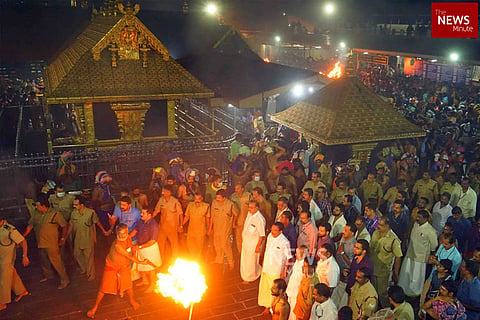

The Supreme Court on Friday, in a historical judgement, ruled that women of all ages can enter the Sabarimala temple. The court observed that men and women are equal in the eyes of the Indian Constitution, and barring the entry of women between the ages of 10 and 50, was in contravention to Article 25 of the Constitution, which says everyone is guaranteed the freedom to practice what religion they choose.
The five-Judge bench -- comprising Chief Justice of India Dipak Misra, Justice Rohinton Fali Nariman, Justice AM Khanwilkar, Justice DY Chandrachud and Justice Indu Malhotra -- came out with four verdicts. CJI Dipak Misra and Justice Khanwilkar authored a single judgement, while Justices Nariman and Chandrachud concurred in their judgements. Justice Indu Malhotra was the sole dissenter.
Here are 5 takeaways from the judgements:
Equality before the eyes of law: “To exclude women from worship by allowing the right to worship to men is to place women in a position of subordination. The Constitution, should not become an instrument for the perpetuation of patriarchy,” the judgement observed. The Constitution, under Article 14, guarantees equality to all, and by stopping the entry of women, the very principles of the Constitution are violated.
Celibacy: “Its effect is to impose the burden of a man’s celibacy on a woman and construct her as a cause for deviation from celibacy,” says the judgement. It added that the mere sight of a woman cannot affect one’s celibacy. “Maintaining celibacy is only a ritual for some who want to practise it and for which even the temple administration has not given any justification,” it adds.
Banning women is a form of ‘untouchability’: The judgement states that banning women was indeed a form of untouchability, “a practice fundamentally at odds to the notion of an equal society”. This is in contravention of Article 17 of the Constitution, which clearly states untouchability has been banned. It also stigmatises women as ‘lesser beings’.
The biology and physiology of women: “Birthmarks and physiology are not the basis to deny constitutional entitlements. To treat women as children of a lesser god is to blink at the constitution itself,” read the judgement. Women cannot be discriminated on the basis of merely being born as women.
Separate denomination: The judgement observed that Devaswoms were Hindu temples, and follows the rules pertaining to Hindu temples. “It is propounded that for the purpose of constituting a religious denomination; not only the practices followed by that denomination should be different but its administration should also be distinct and separate,” it said. “Such denomination must be clearly distinct following a particular set of rituals/practices/usages having their own religious institutions including managing their properties in accordance with law.”